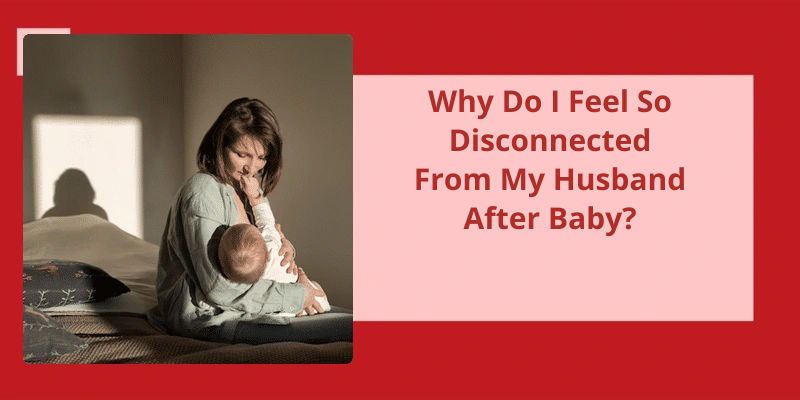The arrival of a new baby is supposed to be one of the happiest moments in a couple's life. However, it isn’t uncommon for the arrival of a baby to bring with it an unanticipated wave of emotional challenges. New parents may feel overwhelmed, exhausted, and at times disconnected. This disconnection can impact their relationship, particularly with their spouse. It isn’t unusual for couples to feel as though they’re living parallel lives, and struggle to connect both physically and emotionally after the birth of their child. This situation isn’t an indicator that the relationship is necessarily doomed. It’s often attributable to a range of personal and situational factors, which can be addressed with compassion and understanding.
Why Do I Feel Different Towards My Partner After Having a Baby?
Add to that the physical changes that occur during and after pregnancy, and it’s no surprise that many new mothers experience a shift in their feelings toward their partner post-baby. It’s important to acknowledge that these feelings are normal, but also to address them proactively in order to maintain a healthy relationship.
A new mothers primary concern becomes the well-being of their infant, which can lead to neglecting their own needs and the needs of their partner. This can create a sense of distance between partners and contribute to feelings of isolation.
Additionally, the physical toll of pregnancy and childbirth can also impact a womans libido and satisfaction with her own body. This can cause a strain on intimacy with ones partner, which further exacerbates any feelings of distance or disconnection. It’s important for both partners to communicate openly about their needs and to work together to find ways to support one another during this transition.
Another potential factor in feeling differently toward a partner after having a baby is the added responsibility and stress of caring for a child. This can create tension and disagreements between partners, which can be difficult to navigate when also dealing with the emotional and physical challenges of parenting. It’s important for both partners to prioritize self-care and to seek outside support if necessary, whether that be from family, friends, or a therapist.
Finally, it’s important to recognize that the experience of having a baby is unique to each individual, and that there’s no “right” way to feel or cope with the changes that come with parenthood. By normalizing these changes and seeking support where needed, couples can work through these challenges and maintain a strong and healthy relationship post-baby.
Coping Strategies for Partners During Postpartum Period
The postpartum period can be challenging for both new parents, but partners can use a variety of coping strategies to help manage stress and support their partner. These may include seeking social support, taking breaks when necessary, practicing relaxation techniques, and maintaining self-care routines. Adopting flexible attitudes and open communication can also help partners navigate the changes and transitions that come with welcoming a new baby into their lives.
However, recognizing the root cause of this emotional disconnection is just the first step towards finding a solution. In this article, we will explore some practical tips and strategies to help you reconnect with yourself and your partner.
Why Do I Feel Emotionally Disconnected From My Partner?
In some cases, the emotions that you experience may be so overwhelming that you keep wallowing in the negativity. This may lead to a sense of hopelessness and low self-esteem, which can eventually lead to emotional disconnection. Other times, the emotions may be suppressed by consciously avoiding triggering situations. In this way, you end up disconnecting from your partner as a means of self-preservation.
Emotional disconnection can also be caused by a lack of communication and intimacy. Over time, couples may drift apart from each other and develop individual interests. In some cases, one partner may feel neglected or unappreciated, leading to feelings of disconnection and resentment.
The Impact of Stress, Work, and Other External Factors on Emotional Connection in a Relationship.
This topic examines how stress, work, and other external factors can affect emotional connection in a relationship.
Source: The Real Reason Your Feeling Disconnected From Your Partner
The birth of a new baby can be an emotional and physical rollercoaster for parents, and it’s not uncommon for relationships to shift as a result. From changes in intimacy and communication, to adjusting to new roles and schedules, the postpartum period can be challenging. However, it’s important to remember that these changes are normal and temporary, and with time and patience, couples can navigate this new phase in their lives together.
Is It Normal for Relationships to Change After Having a Baby?
For some couples, having a new baby can be a challenging and overwhelming experience, especially when it comes to maintaining intimacy and keeping the romance alive. The arrival of a newborn baby means that you’ve to divide your time and attention between your partner, your baby, and other daily responsibilities. This can lead to a lack of quality time spent together and can also cause feelings of neglect and resentment to develop.
Body changes are also common after childbirth, and this can affect the way you feel about yourself as well as the level of attraction that you feel towards your partner. Weight gain, stretch marks, and other physical changes can make you feel self-conscious and may even cause you to withdraw from your partner. It’s important to remember that these changes are normal and that they won’t last forever.
In addition to physical changes, lack of sleep can also impact your relationship with your partner. Taking care of a newborn baby requires round-the-clock attention, and this can leave you feeling exhausted and irritable.
Despite all these changes, it’s important to remember that it’s normal for relationships to go through a period of adjustment after having a baby. It takes time to adapt to the new responsibilities and demands of parenthood, and it’s important to be patient with yourself and your partner. Communicating openly and honestly about your feelings and needs can also help you to navigate this challenging period and maintain a strong, healthy relationship.
Remember that this period won’t last forever, and with some effort and communication, you can maintain a strong, healthy relationship that lasts for years to come.
The first few months after having a baby can be overwhelming, even for the most prepared parents. It’s not uncommon for new mothers to experience a wide range of emotions, including resentment towards their partners. However, it’s important to understand that these feelings are normal and can be managed with the right support and communication. So, if you’re feeling resentful towards your partner after having a baby, you’re certainly not alone.
Is It Normal to Feel Resent Towards Your Husband After Having a Baby?
Having a baby is a huge life change that can be both exciting and overwhelming. As a new mother, you may feel exhausted, emotional, and uncertain about your new role. It’s common for new parents to experience a range of emotions, including resentment towards their partner. You may feel like your partner isnt doing enough to help you or that they don’t understand what youre going through. These feelings are perfectly normal and can be managed with open communication with your partner.
It’s important to understand that having a baby can be a stressful time for any relationship. It requires both partners to adjust to new routines, responsibilities, and sleepless nights. Sometimes, this can cause tension and conflict. It’s essential to remember that you and your partner are in this together. Talk openly about your feelings and try to work through any disagreements or misunderstandings that may arise.
One of the most important things you can do to ease feelings of resentment is to prioritize self-care. As a new mom, you may feel like you’ve to be available 24/7 to your baby, but it’s crucial to take time for yourself. Whether it’s a bubble bath, a walk outside, or a coffee break with a friend, make time to recharge your batteries and nurture your own needs.
Another way to alleviate feelings of resentment is to create a support network. Surround yourself with people who can offer help and support, whether it’s family, friends, or a postpartum support group. Having someone to talk to and vent your frustrations can go a long way in easing resentment and creating a more positive outlook on your new life as a parent.
It’s also helpful to approach your partner with empathy and understanding. Remember that they too are adjusting to the changes that come with parenthood. Try to communicate your feelings from a place of love and understanding rather than anger or frustration. This can foster a more collaborative and supportive relationship, which can help you navigate the challenges of parenting together.
How to Avoid Common Misunderstandings With Your Partner After Having a Baby
Having a baby is a huge life change that can sometimes lead to misunderstandings in romantic relationships. Communication is key to avoiding common misunderstandings. It’s important to express your needs and concerns clearly, actively listen to your partner, and make time for each other. Remember to show appreciation and support, and work together as a team to navigate the challenges of parenthood.
It’s important to remember that relationships go through ups and downs, and feeling disconnected is just one of those downs. However, you may start wondering why you’re feeling this way, and what you can do to reconnect with your partner. Let’s explore some common causes of feeling disconnected in a relationship and how to address them.
Is It Normal to Feel Disconnected in a Relationship?
It’s crucial to remember that we’re multifaceted beings, with complex emotions and needs. Sometimes, we may be preoccupied with personal matters that affect our mood and energy levels, making it difficult to connect with our partner. It’s also worth acknowledging that relationships go through ups and downs, and feeling disconnected is often a temporary hurdle.
If youre experiencing a sense of disconnection, it’s essential to communicate openly with your partner. Share how youre feeling and ask for support. Sometimes, just talking about your concerns can help you feel more connected and can lead to finding solutions together. Additionally, planning activities or spending quality time together can help rekindle the intimacy in your relationship.
Open communication, quality time, and efforts to deepen your connection with your partner can help you reconnect and find the closeness you desire. Remember, relationships are a journey, and not every day will be perfect, but the effort to connect and strengthen the bond is worth it in the end.
However, lingering anger towards your partner after having a baby can be a serious problem. It can strain your relationship and create unnecessary tension in your household. It’s important to take a closer look at what’s causing these feelings and find constructive ways to address them.
Why Am I So Angry at My Partner After Having a Baby?
One of the biggest reasons why new parents can become angry with their partner after having a baby is due to the change in the dynamic of their relationship. Before the baby, it was just the two of them and they were able to do as they pleased. However, after the baby arrives, everything changes. Suddenly they’re responsible for not just themselves, but for their child as well. This can be a massive shock to the system, and it can understandably lead to feelings of anger and resentment.
The constant waking, feeding and changing can really take it’s toll on both parents. If one parent is getting more sleep than the other, it can lead to feelings of bitterness and frustration. This can cause the partner who’s getting less sleep to resent the other for not being as involved or not understanding how hard it is.
Additionally, having a baby can put a strain on finances. The cost of diapers, formula, and other baby essentials can quickly add up. If one partner feels that they’re carrying the bulk of the financial burden, they may become angry with their partner for not contributing more. This can lead to feelings of resentment and stress, which can ultimately damage the relationship.
One of the biggest changes that occur after having a baby is the lack of time for personal interests and hobbies. This can be especially challenging for couples who enjoyed spending time doing things together before the baby arrived. If one partner is still able to pursue their interests and hobbies while the other is left feeling stuck at home, it can lead to feelings of resentment and bitterness. This can make it difficult for the couple to connect and have quality time together.
Finally, having a baby can stir up a wide range of emotions, including anxiety, depression, and feelings of inadequacy. If one partner is struggling with these emotions while the other seems to be coping well, it can lead to feelings of anger and resentment. This can be especially frustrating for the partner who’s struggling, as they may feel that their partner isn’t truly supporting them during this challenging time.
It’s important to remember that this is a challenging time for both partners, and it’s normal to feel overwhelmed and frustrated. Open communication and understanding can go a long way in helping couples navigate this new phase of life and come out stronger on the other side.
Conclusion
Furthermore, it’s important to recognize that a new baby can bring immense changes and challenges to a relationship. It’s normal to feel disconnected or even resentful towards your partner during this time. However, it’s crucial to communicate these emotions and work together to find solutions that work for both of you. Remember to prioritize self-care and make time for intimacy, even if it means sacrificing other obligations temporarily. With effort and patience, it’s possible to not only reconnect with your partner, but also deepen the bond that brought you together in the first place.






